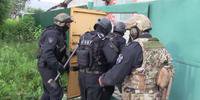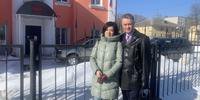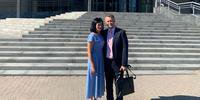Case of Smelov in Kondopoga
Filter
- #
Lieutenant Colonel of Justice M. V. Golubenko, Deputy Head of the Federal Security Service Directorate for the Republic of Karelia, makes a decision to initiate a criminal case against 44-year-old Aleksey Smelov under Part 1 of Article 282.2 of the Criminal Code of the Russian Federation. The basis for this is the report of the FSB operative, Lieutenant S. A. Usoltsev.
The document notes that the believer "performed organizational, informational and supervisory functions in the local division of the banned religious organization" Administrative Center of Jehovah's Witnesses in Russia "took measures to intensify the activities and development of this extremist religious organization in Kondopoga by committing actions ... expressed, among other things, in the convening of meetings, the organization of propaganda activities, the attraction of new members.
- #
At about 11 o'clock in the morning, law enforcement officers call the Smelovs' doorbell and, posing as plumbers, seek to be allowed inside. Those who entered turn out to be employees of the FSB of Russia in the Republic of Karelia: senior investigator Danila Vashchenko, head of the department in Kondopoga Vitaly Abazovik, senior detective B.O. Dudnik and specialist in the field of computer technology O.Y. Dagdanov. The search lasts more than four hours. Family members, especially the 14-year-old daughter, are very frightened. The system unit of the computer, laptop, phones, tablets, flash drives and the Bible are seized from believers. Law enforcement officers are also conducting a search in the car and at the workplace of Alexei Smelov.
Irina, his wife, is taken to the FSB department in Kondopoga. The interrogation is conducted by investigator Vashchenko. Aleksey is also interrogated in Kondopoga, and then at about 22:00 he is taken to the main department of the FSB in Petrozavodsk. There, another investigator invites him to confess to the crimes. After his fingerprints were taken, he is allowed to go home around 11:30 p.m.
Senior investigator of the Investigative Department of the FSB of Russia in the Republic of Karelia, Major of Justice S. V. Grigoriev chooses Smelov a measure of restraint in the form of a written undertaking not to leave and proper behavior.
- #
- #
Aleksey Smelov is charged with committing a crime under Part 1 of Article 282.2 of the Criminal Code of the Russian Federation.
- #
Due to the epidemiological situation, the preliminary investigation against Smelov is suspended "to ensure the safety of life and health of the accused."
- #
The preliminary investigation is resumed and accepted for production by investigator S. V. Grigoriev.
- #
The case is submitted to the Kondopoga City Court of the Republic of Karelia. It is referred to Judge Alexander Ivanov for consideration.
- #
The prosecution reads out the reports of the FSB operative officer Usoltsev, transcripts of his conversations about the Bible with Jehovah's Witnesses - he kept notes of discussions, pretending to be interested in the Bible.
The defendant Smelov expresses his attitude to the prosecution and declares his disagreement with it, considering it persecution for faith. He says: "The accusation that has been brought against me calls religious worship, preaching, saying prayers and transmitting religious symbols as illegal activities. However, this grossly contradicts the clear provision of Article 28 of the Constitution of the Russian Federation."
Smelov continues: "Someone performs prayers in churches and homes; someone performs namaz, and someone tells others about what he believes in; Some are called a deacon or priest, and some are called an elder. Neither is prohibited and should not give rise to criminal prosecution."
The defendant asks: "Should I renounce my religious beliefs or stop expressing them in order to avoid criminal liability? But this is nothing less than discrimination."
- #
Interrogation of prosecution witnesses. One of them reports that at the first meeting with the FSB officer Usoltsev, he himself asked for her phone number and called her, pretending to be interested in the Bible. The witness herself did not impose her views on him.
- #
The court interrogates the secret witness "Mikhailov". Answering questions from the defense or the court, he refers to his own conclusions or to a source that he refuses to name.
- #
The written materials of the case shall be announced. The prosecutor draws attention to the protocol, which indicates that the publications of Jehovah's Witnesses are part of their worldwide educational activities.
- #
The court interrogates investigator Grigoriev and operational officer Usoltsev. Their testimonies differ as to the dates of the operational-search activities. According to Grigoriev, the date indicated in the protocol is correct. However, Usoltsev points to the error, explaining it by improper configuration of technical equipment. He says he videotaped and audio the Bible talks on April 19 and 21, 2019.
- #
The court examines the literature of Jehovah's Witnesses in paper and electronic form, which speaks of who they are and what they believe. An excerpt from the biographical book is also read, which tells us that Jehovah's Witnesses even treated the guards in the concentration camps with respect.
- #
During the court hearing, the assistant prosecutor reads the entire transcript of the service, which is devoted mainly to the development of such qualities as meekness and humility.
- #
Excerpts from the liturgical materials of Jehovah's Witnesses are read out, in particular about respect for the authorities and the importance of a peaceful attitude towards people. Judge Ivanov acknowledges that the case concerns the defendant's religious life exclusively, and he is impressed by the good organization of worship services for Jehovah's Witnesses.
- #
The court is reviewing photographs of Aleksey Smelov and his family taken at the service. The photo depicts peaceful, intelligent, open people.
- #
During the study of written materials, dozens of letters of gratitude of the Smelovs' children and letters of thanks to their parents for their upbringing are read out, where such qualities of children as kindness and responsiveness are emphasized. The characteristics of Alexei from the place of work are also announced. The prosecutor notes that it is "extremely positive."
- #
The prosecutor requests a fine of 500 thousand rubles for Alexei Smelov.
- #
The court listens to an audio recording of the worship service. Alexei Smelov testifies.
Connecting each part of his speech with the points of accusation, Alexei talks about the biblical principles that guide him in his life. The defense compares passages from different translations of the Gospel, and also cites excerpts from secular sources and expert opinions regarding the name of God, the good reputation of Jehovah's Witnesses and their creeds.
- #
In the debate, the defense takes the floor. Judge Ivanov decides to resume the judicial investigation in the case of Smelov.
The next hearing is scheduled for February 14 and 15.
- #
The court found Aleksey Smelov guilty and sentenced him to a fine of 400,000 rubles.
- #


